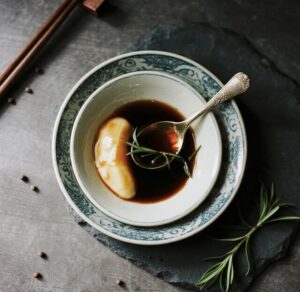目录
ToggleChinese black vinegar is a traditional condiment that has been used in Chinese kitchens for centuries. Known for its rich color, deep umami flavor, and subtle sweetness, it stands out from other types of vinegar due to its unique fermentation process and grain-based origins. As global cuisine evolves, this ingredient has started gaining attention outside of Asia for its culinary versatility and depth of flavor.
This article explores the nature of Chinese black vinegar, its regional variations, modern applications, and proper usage in a wide range of cooking contexts.
What Is Chinese Black Vinegar?
Unlike vinegars made from fruits or wine, Chinese black vinegar is produced by fermenting grains such as sticky rice, sorghum, wheat husks, or millet. The fermentation process is often prolonged and may involve aging in clay jars, which contributes to the vinegar’s distinctive dark hue and layered taste. Over time, the raw acidity softens, revealing mellow notes of malt, smoke, and sometimes caramel.
This fermentation method is highly regionalized, meaning that different provinces produce different styles of black vinegar, each with its own personality.
Regional Varieties of Chinese Black Vinegar
There are several traditional types of Chinese black vinegar, each rooted in a different area of China and characterized by unique ingredients or fermentation styles:
- A Jiangsu-style vinegar, often known for its balanced sweetness and gentle acidity, is widely used in dipping sauces, especially for dumplings and cold appetizers.
- In northern Shanxi, black vinegar is often aged for longer periods and made using a mix of grains. The result is a full-bodied, slightly smoky flavor, best used in braised meat dishes or hearty soups.
- Sichuan’s version of black vinegar may be infused with medicinal herbs or additional aromatics. It is frequently paired with spicy foods or used to enhance hot and sour broths.
Understanding these regional differences allows cooks to select the ideal vinegar based on the dish they are preparing.
Cooking with Chinese Black Vinegar
Thanks to its complex flavor profile, Chinese black vinegar is suitable for a variety of culinary uses. It does more than just add sourness—it builds depth and enhances umami. Some common uses include:
- Dipping sauces: Combine with minced garlic, chili oil, or sesame paste for a balanced condiment that pairs well with dumplings, noodles, and fried snacks.
- Cold dishes: Toss sliced cucumbers, mushrooms, or tofu with a light drizzle for a quick and refreshing salad.
- Braised recipes: Add during cooking to cut through fatty meats like pork belly or duck, while enhancing the overall aroma of the dish.
- Soups and stews: A few drops can brighten the flavor of rich broths, particularly in hot and sour soup or beef noodle soup.
- Modern fusion: In Western-style dishes, it can substitute for balsamic vinegar in salad dressings, marinades, or even sauces for grilled vegetables and meats.
Nutritional and Dietary Considerations
Although not a major source of vitamins or minerals, Chinese black vinegar is appreciated for being naturally low in calories, fat-free, and free from artificial additives in traditional preparations. It may retain small amounts of amino acids from the grains used in fermentation. In some traditional diets, it is believed to aid digestion and improve circulation, although such claims should be viewed with scientific caution.
It’s important to note that many varieties of Chinese black vinegar contain gluten due to the use of wheat or barley. Those with gluten intolerance should read labels carefully or seek gluten-free alternatives.
Proper Storage of Chinese Black Vinegar
Maintaining the quality of Chinese black vinegar depends on how it is stored:
- Store in a dry, shaded place with the lid tightly closed to prevent oxidation.
While refrigeration is not required, it may help preserve flavor over extended periods, especially in warmer climates. - Avoid placing the bottle near heat sources like stovetops or windows.
Inspect for changes in aroma or appearance, which may indicate spoilage if the product has been open for a long time.
When stored properly, black vinegar can maintain its quality for over a year without significant flavor loss.
Why Chinese Black Vinegar Is Becoming a Global Favorite
The growing popularity of fermentation, natural condiments, and traditional ingredients has led to renewed interest in Chinese black vinegar. Its ability to add depth and dimension to both Asian and non-Asian dishes makes it an increasingly common item in contemporary kitchens.
It appeals to professional chefs experimenting with fusion cuisine, home cooks looking for healthier flavorings, and anyone who enjoys ingredients with rich cultural backgrounds. As people look for ways to make meals more flavorful without excessive salt or fat, black vinegar offers a compelling solution.
In conclusion, Chinese black vinegar is more than just a pantry staple in Chinese cuisine—it is a versatile and dynamic ingredient with a place in many types of cooking. Whether you’re crafting a traditional recipe or developing something entirely new, learning how to properly select and use Chinese black vinegar can open up a wide range of flavor possibilities.
0